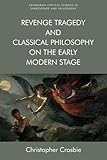Revenge Tragedy and Classical Philosophy on the Early Modern Stage / Christopher Crosbie.
Material type: TextSeries: Edinburgh Critical Studies in Shakespeare and Philosophy : ECSSPPublisher: Edinburgh : Edinburgh University Press, [2022]Copyright date: ©2018Description: 1 online resource (320 p.)Content type:
TextSeries: Edinburgh Critical Studies in Shakespeare and Philosophy : ECSSPPublisher: Edinburgh : Edinburgh University Press, [2022]Copyright date: ©2018Description: 1 online resource (320 p.)Content type: - 9781474440288
- 822/.309
- online - DeGruyter
| Item type | Current library | Call number | URL | Status | Notes | Barcode | |
|---|---|---|---|---|---|---|---|
 eBook
eBook
|
Biblioteca "Angelicum" Pont. Univ. S.Tommaso d'Aquino Nuvola online | online - DeGruyter (Browse shelf(Opens below)) | Online access | Not for loan (Accesso limitato) | Accesso per gli utenti autorizzati / Access for authorized users | (dgr)9781474440288 |
Browsing Biblioteca "Angelicum" Pont. Univ. S.Tommaso d'Aquino shelves, Shelving location: Nuvola online Close shelf browser (Hides shelf browser)

|

|

|

|

|

|

|
||
| online - DeGruyter Islam in Modern Turkey / | online - DeGruyter ReFocus : The Films of Elaine May / | online - DeGruyter Rancière and Music / | online - DeGruyter Revenge Tragedy and Classical Philosophy on the Early Modern Stage / | online - DeGruyter Researching the Middle East : Cultural, Conceptual, Theoretical and Practical Issues / | online - DeGruyter Migration and Modernities : The State of Being Stateless, 1750-1850 / | online - DeGruyter Reading Experimental Writing / |
Frontmatter -- CONTENTS -- Acknowledgements -- Series Editor’s Preface -- Introduction: On Revenge Tragedy and the Shaping Influence of Classical Philosophy -- 1. Oeconomia and the Vegetative Soul: Thomas Kyd’s Naturalisation of Revenge in The Spanish Tragedy -- 2. Fixing Moderation: Titus Andronicus and the Aristotelian Determination of Value -- 3. ‘A fine pate full of fine dirt’: Hamlet among the Atomists -- 4. ‘Vein by vein’: The Pneumatics of Retribution in John Marston’s Antonio’s Revenge -- 5. Prohairesis on the Inside: The Duchess of Malfi and Epictetian Volition -- Epilogue: A Kind of Sensible Justice -- Index
restricted access online access with authorization star
http://purl.org/coar/access_right/c_16ec
Examines the influence of classical philosophy on revenge narratives by Shakespeare and his contemporariesAnalyses the twentieth-century development of revenge tragedy as a genre, and diagnoses the roots of modern criticism’s tendency to treat most philosophy as estranged from the violent work of revengeProvides fresh readings of five plays central to the revenge tragedy genre, paying close attention to the conditioning influence of classical philosophy on their narratives of retributionReveals how revenge tragedy’s distinctive ‘moods’ or ‘atmospheres’ emerge from fully-realized sets of ontological assumptions which help shape reception of retribution on the early modern stageDevelops new reception histories for five classical philosophical doctrines, revealing their currency and, what’s more, radical adaptability within early modern EnglandThis book discovers within early modern revenge tragedy the surprising shaping presence of a wide array of classical philosophies not commonly affiliated with the genre. By recovering the pervasive influence of Aristotelian faculty psychology on The Spanish Tragedy, Aristotelian ethics on Titus Andronicus, Lucretian atomism on Hamlet, Galenic pneumatics on Antonio’s Revenge and Epictetian Stoicism on The Duchess of Malfi, Crosbie reveals how the very atmospheres and ontological assumptions of revenge tragedy exert their own kind of conditioning dramaturgical force. The book also revitalises our understanding of how the Renaissance stage, even at its most lurid, functions as a unique space for the era’s practical, vernacular engagement with received philosophy.
Mode of access: Internet via World Wide Web.
In English.
Description based on online resource; title from PDF title page (publisher's Web site, viewed 29. Jun 2022)


